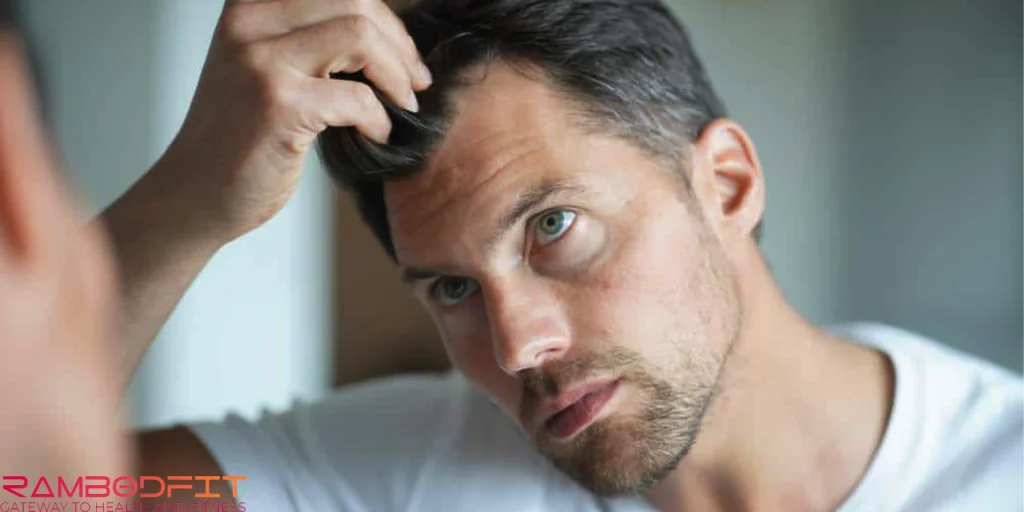


Man, if I had a dollar for every time someone freaked out about creatine making their hair fall out, I’d probably be able to buy a lifetime supply of the stuff. People hop on creatine, peek in the mirror two weeks later, and suddenly every stray hair on the pillow is a crisis. Been there, trust me—I’ve cycled creatine more times than I’ve changed barbers, all the while keeping a paranoid eye on my hairline like it’s a stock ticker. Look, the “does creatine cause hair loss?” debate is practically gym folklore at this point, and that’s exactly where the creatine hair loss myth comes from.
So let’s cut the crap, ditch the panic, and dig into what science actually says, what’s total nonsense, and whether you should really be side-eyeing your shaker bottle. And yeah, Rambodfit’s got your back on this one.
Table of Contents

If you’ve spent more than five minutes in a gym (or, honestly, on gym TikTok), you’ve definitely heard folks hyping this stuff up. It’s everywhere for a reason. You’ll find a pinch of it in steak or fish, sure, but most of us are shoveling in powder we bought online, not dissecting a ribeye for those sweet, sweet gains. And guess what? Your liver and kidneys are DIY-ing a bit of it, too. Bodies are wild, and so are rumors like the creatine hair loss myth keep popping up even when the science doesn’t back them.
Here’s the deal: creatine’s basically the body’s “Oh crap! Need more power!” button. It tops up your ATP—think of ATP like your muscles’ pocket change for energy. The second you go all out—sprints, deadlifts, those attempts at looking cool in a CrossFit gym—you blow through your ATP stash way too fast. Take creatine, and now you’ve basically got a little more cash to spend, muscle-wise, so you can keep going harder, longer, and you’re not crawling out of the gym wondering what year it is. That’s the real story—not the creatine hair loss myth that gets recycled over and over.
Speaking from the trenches? Creatine totally leveled up my workouts. I started being able to put up a few more reps, and everything just felt… less impossible. Not saying I turned into the Hulk overnight, but my old PRs started looking a bit pathetic. Of course, in the back of my mind, there’s always that “am I gonna go bald for this?” panic any time I read one of those horror stories online. But after years of use, the only thing thinning out is my patience for the creatine hair loss myth—and yeah, still rocking a decently full head of hair.
Alright, so this whole “creatine makes you bald” thing? Classic game of telephone. It kicked off all the way back in 2002 because of this one tiny study on rugby players. The scientists thought, “Hey, looks like creatine bumps up this hormone called DHT.” DHT, by the way, has a reputation for zapping your hair follicles and speeding up male-pattern baldness. They saw higher DHT in blood tests after the dudes took creatine, and boom—suddenly everyone’s throwing around the creatine hair loss myth like it’s a proven fact.
But here’s what gets me—there’s a huge BUT no one talks about:
Yeah, sure, creatine might nudge hormone levels a bit here and there. But to just straight-up blame it for hair loss? That’s a pretty wild leap. Don’t buy into the creatine hair loss myth—stick with the facts, not the fear.
👉 See the study here (2002 rugby players)

Okay, so everyone yells about DHT like it’s the villain twirling its mustache, plotting your next receding hairline. People call it the “most androgenic” hormone in dudes, and yep, unlike testosterone, it doesn’t pull any of that “let’s turn into estrogen” nonsense. So, naturally, it catches all the blame for male pattern baldness and fuels the creatine hair loss myth along the way.
But here’s the curveball:
Your body’s loaded with androgen receptors—think of them as little parking spots for hormones like DHT. When DHT comes cruising by, if there’s more empty spots (especially on your scalp), it jumps in and starts doing its thing—shrinking your follicles and, boom, thinner hair. This science often gets twisted into the creatine hair loss myth, even though creatine itself isn’t the culprit here.
Bottom line? You can freak out about creatine or freak out about DHT, but honestly, it’s your genes running the show. If baldness runs deep in your family tree, your scalp’s probably stacked with these hormone parking meters, just waiting for DHT to roll up. Sorry, blame your ancestors, not your supplements—and definitely not the creatine hair loss myth.
👉 Further reading on androgen receptors and hair loss
Nope, creatine’s not turning you into Mr. Clean overnight. Yeah, there are a couple of studies out there where DHT nudged up a bit after creatine use, but here’s the kicker: just working out bumps your DHT by like 15% anyway. Wild, right? That tiny blip has been twisted into the creatine hair loss myth, even though genetics is the real driver of your hairline’s future. Plus, if you’re destined for hairline disaster thanks to your genes, it’s coming whether you chug creatine, eat kale, or just chill on the couch.
Honestly, creatine’s probably one of the safest, most studied supplements out there—everyone uses it for strength, muscle, all that good stuff. So if you start spotting extra forehead in the mirror, real talk? Blame your family tree, not your shaker bottle. The creatine hair loss myth makes it sound like creatine is the villain in your follicle saga, but in reality, it’s just bad science and a lot of gym gossip.
No need to just toss creatine in the trash, seriously. If you’re worried about DHT (that little troublemaker), why not mess with it right at the source? Stuff like RU58841 slathered on your scalp can keep DHT from locking onto those pesky receptors—yeah, people have actually studied this. And honestly, if you chat with a dermatologist, they’ll probably bring up classics like finasteride or toss minoxidil into the mix. It’s all about finding what works for your noggin without stressing over the creatine hair loss myth, because supplements and hair health aren’t nearly as linked as the rumors make it sound.
When I first stumbled across that whole 2002 rugby study, I low-key freaked out. Dropped creatine like it was radioactive or something—for half a year, no joke. But did my hairline magically chill out? Not even close. That panic was just me buying into the creatine hair loss myth instead of looking at the bigger picture.
Turns out, the extra hairs in the drain had way more to do with my trash sleep schedule, stress levels through the roof, and, yeah, my family’s questionable follicle genetics than my daily creatine fix. These days, I’m back on the creatine train, but I actually pay attention to scalp care and, you know, try not to live like a goblin. Hair’s still hanging in there, and I’ve learned not to let the creatine hair loss myth mess with my routine.

Honestly, creatine’s not the villain folks make it out to be when it comes to losing your hair. If you’re destined to rock the Jason Statham look one day, that train was already coming, creatine or not. Yeah, it might nudge your DHT levels up a bit, but let’s be real—the real problem’s your DNA and how many AR receptors your scalp’s got lurking around. That’s why the creatine hair loss myth keeps floating around, even though genetics are really steering the ship.
Don’t toss your creatine tub just yet. If you’re stressing over your hairline, tackle the issue where it counts: those stubborn little receptors, not the supplement that’s helping you hit PRs in the gym. The creatine hair loss myth is just noise—focus on training smarter and, if needed, actual hair health strategies.
No. The evidence is weak and limited to a single small study. Most research does not support creatine as a direct cause of baldness.
Not necessarily. Your genetics will play a much larger role in hair loss than creatine. If concerned, focus on AR-blocking treatments rather than cutting creatine.
Creatine is already one of the safest supplements available. Beta-alanine and betaine are alternatives, but they don’t match creatine’s effectiveness in strength and hypertrophy.